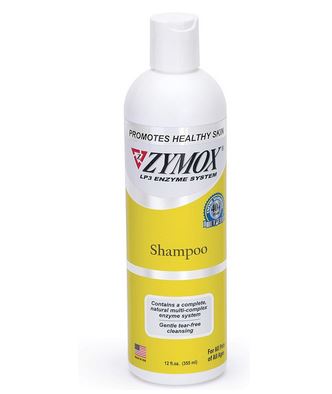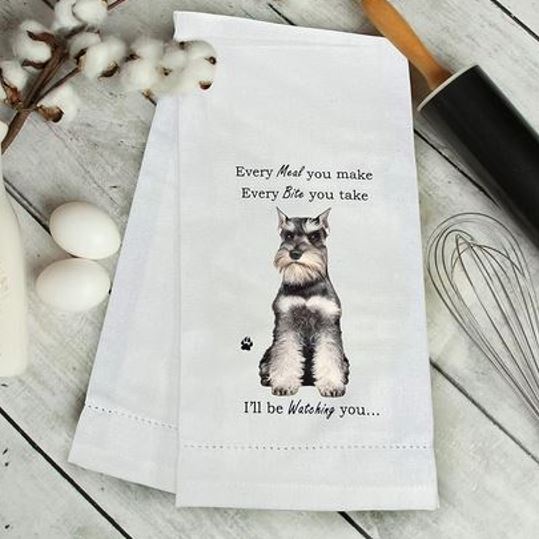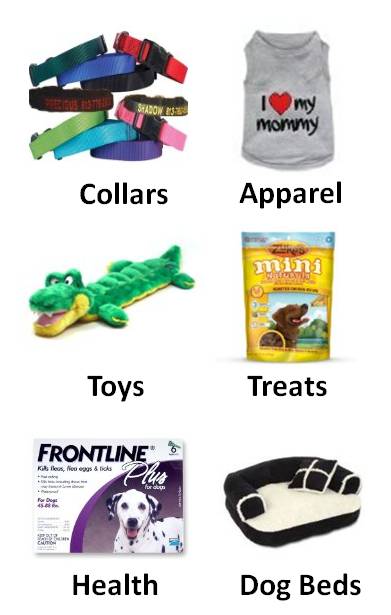Save On Vet Costs
Who wants to save on vet costs? The fact is Veterinary care is expensive and if your Miniature Schnauzer becomes seriously ill, you could easily spend thousands of dollars. Today veterinarians are able do wonderful advanced life-saving procedures on our pets but... it ain’t cheap folks. In this article, Dr. Andrew Jones, the online vet explains some of the reasons for such high veterinary fees and how we all can save on vet costs.
The Cost of Doing Business
The costs involved in operating a veterinary practice are many and huge. First, veterinary salaries have risen over the years and newer vets are demanding higher and higher starting salaries. Even veterinary support staff members are demanding higher salaries. Next you have to factor in the huge overhead costs of actually running a veterinary practice which include all the specialized equipment to perform exams, X-rays, ultrasounds, surgeries, monitoring equipment, anesthetic equipment, kennels and cages, ventilation, as well as the basic costs of building maintenance , rent, utilities, and the list goes on and on.
On top of that, even though the pet population is increasing, most cities have more veterinarians than they really need. So, in order to keep up, vets increase their fees. In fact some vets may even recommend more procedures than are really necessary just to stay ahead of the game. So what can we do to save on vet costs?
10 Ways to Save Money at the Vet
1. Shop Around: Prices at animal hospitals can vary widely. So in order to save on vet costs, you will need to shop around. Get recommendations from other pet owners to help you decide.
There seems to be a misconception that higher priced practices give a better quality of care, but this is not necessarily true. To ensure that you are both saving money and getting quality care for your pet, ask some specific questions:
Does the vet practice have an animal health technician? They should.
Does the vet practice have up-to-date anesthetic and monitoring equipment? A must have.
Does the vet practice have all pets monitored after anesthesia until they are fully awake? I would hope so.
Answers to these questions will give you an idea if there is adequate
staff at the vet clinic to give quality patient care to your pet. Also
ask about common procedures, like vaccines, checkups, neutering and
spaying.
Plan on going to at least three vets before deciding on the one for your pet. In addition, ask about discounts. Some vets offer multiple pet discounts as well as discounts for seniors, but you have to ask if you want to save on vet costs. And during your visits, be sure to make a mental note of the cleanliness of the environment.
2. Question additional procedures: Here's another way to save big on vet costs... For example: Let's say your pet is being examined and your vet suggests your dog have a dental cleaning. Be sure to ask and question, Why? Just how bad are the teeth? Is the degree of dental disease really that significant? One of the major veterinary associations is advising that any pet with Grade 1 Gingivitis (mild gum inflammation) have a dental scale and polish. This procedure is at least $300 and it has risks, as your pet would need to be under general anesthetic. READ: A tribute to Mini Schnauzer Albert who's life ended during a routine dog dental cleaning.
Dental cleanings have high profit margins and the Animal Health Technician or Assistant usually does all the work. However, a pet with mild gum disease does NOT need this done. You can begin a preventive care program at home right away by brushing your pet’s teeth daily and feeding a diet designed to break off some of the plaque and tartar.
This is only one example of adding on a procedure for extra vet charges. So be sure to question any recommendations. Is it is absolutely necessary? Is there an alternate or less costly (and sometimes safer) option?
3. Hospitalization Fees: Vets make a LOT more money if they can keep your pet in the veterinary hospital. They can charge a fee for the day of hospitalization, plus a fee for re-examining your pet in the morning.
So here's yet another example of how to save on vet costs: Let's say you and your vet suspect your Schnauzer has an arthritic knee, but want to confirm this with x-rays. Ask to schedule an appointment to have the x-rays done while you are there and waiting. It doesn’t take long to perform x-rays so they will likely comply. But again, you have to ask. This way you get a lower price, so you save money and there's an added benefit: your pet spends less time away from you. Now, doesn’t that sound good to you?
4. Pet Vaccines - NOT Needed Every Year:
This tip alone will save on vet costs for you and help your pet live longer at the same time.
Pet vaccines have a longer duration of immunity than 1 year, so your pet does not need to be vaccinated yearly. Your new puppy or kitten does need to be vaccinated as this is the time when they are most at risk. And they need to get boosters at 1 year. After that, vaccines are needed only every 3 years and your vet should only vaccinate for what is needed in your area. Also, mature pets between the ages of 10-12 years should stop being vaccinated.
So ask your vet about their vaccine protocols. If they are not with the "vaccinate less often program", consider switching vets. It will be healthier for your pet and your pocketbook.
5. Practice Preventative Health Care: Do not wait until your pet's health gets serious before visiting your vet. Practice preventative care through an annual pet checkup with your veterinarian and perform weekly at-home exams on your dog these practices will help save on vet costs.
(You can use my free e-book: The At Home Pet Health Exam, in which I teach you how to examine, diagnose, and treat your pet at home just by signing up for my complimentary 7-day E-course and newsletter).
6. Pet Food: What is going in your Pet’s Mouth? After surgical procedures, food is the second most expensive item for pet owners. Individually, Americans spend about $250 a year on food for their pets making it a $15 billion industry. I firmly believe that a BIG key to avoid the excess Veterinary expenses is by feeding your pet the BEST quality food you can. Diet is a big key to a healthy pet. And the healthier the pet the more you save on vet costs.
In days gone by, dogs and cats survived on prey that they hunted. Cats got their moisture from the dead bird or mouse not by drinking water and dogs chewed on bones which kept their teeth clean. But today pets feast on ready-to-eat packaged foods, which in some cases, may be harming them.
Symptoms of a less-than-natural-diet include: bad breath, itchy skin, dull dry coats, and intestinal gas.
And commercial pet foods do not always provide all of the nutrients that some dogs and cats need to be healthy at different stages of their lives.
Worst yet, commercial pet foods contain things like chemical additives and preservatives which your pet does not need at all. Take propylene glycol, for example. It is a preservative that is commonly used in pet foods to keep them moist and fresh but this preservative has been linked to anemia and bloat.
One of the single most important things you can do for your pet’s health (which will also end up saving money at the vet in the long run) is to feed a more natural diet. I have seen natural diets improve allergies, arthritis, diabetes, chronic vomiting and diarrhea.
If you are using a commercial pet food, here are some tips to check for quality:
Ingredients are listed in descending order. The first ingredient should be an animal-based protein. The entire protein should be listed first. Avoid foods that list by-products. Avoid those that list the food fractions (like wheat middlings or corn gluten) instead of the whole grain. These ingredients are leftovers from the human food processing and do not provide the best nutrition. Look for natural preservatives. These include Vitamin C (ascorbic acid), Vitamin E and mixed tocopherols. Avoid Ethoxyquin, BHA, BHT and propylene glycol. Avoid foods with artificial flavor enhancers, such as phosphoric acid. Avoid artificial colors. These include azo, azo dyes, and sodium nitrite. Essential fatty acids must be added. This is of utmost importance for allergies, arthritis and cancer prevention. Your pet's food should also contain additional antioxidants, such as Vitamin E, Vitamin C and flavanoids.
Some of the Commercial Pet Foods that I recommend are: Wysong, Solid Gold, Nutro Ultra, Holistic Nutrition, Flint River Ranch, and Azmira Holistic Animal Care LifeStyle.
I am of the opinion that you should consider adding in raw food as a portion of your pet’s diet. I also believe that the healthiest food is that which you make at home - i.e. homemade diets. I give you several examples in my book, Veterinary Secrets Revealed.
7. Pet Insurance – Is It A Scam? The entire insurance industry gives me the heebie jeebies and Pet Insurance companies are NO different. Decide first if you really need Pet Insurance. Unless you cannot resist a breed with chronic problems, pet insurance will probably cost you more money than it will save you. As with human health insurance, you'll pay deductibles, co-pays, and premiums, and you may bump up against lifetime payment ceilings if you own a chronically ill pet.
In addition, you might find some needed treatments are excluded from coverage. And then some policies might limit the amount they will pay per incident and may make you pay more as your pet ages. So do some research first. You might find that setting aside money for future vet bills into a savings account, is a better route to take.
8. Don't Buy Your Medication From Your Vet: Medication is already expensive and it’s even more expensive at the vet's office. The markups on medicines range from 50% to 125% PLUS the prescription fee.
There are many ways to save money on pet medications. First, ask your vet about a drug's cost and find out if it is available through pharmacies. Your local drug store may offer it at a much cheaper price. Also, ask your vet about lower-priced generic medications that would be appropriate to use. And you could save on your pet's prescriptions by shopping online.
Remember, you have the right to ask your veterinarian for prescriptions that you can fill elsewhere, as well as medical records for your pet, which can be a big help if you decide to consult another vet for a second opinion. But again, you have to ask.
9. The Referral Expense: Here's yet another time when you can save on vet costs. Let's say your pet becomes seriously ill and a specialist is needed. Ask your vet to recommend at least two specialists so you can compare treatment quotes and options. Alternatively, contact the nearest veterinary medical school teaching hospital for a specialist or for a referral in your area.
An initial consultation will likely cost $75 to $100. Get an estimate of all costs including surgery, treatments, and any lifelong medications that will be required. You'll also want to know about the prognosis for survival and your pet's expected quality of life. Approach the specialist in much the same way you would approach your local veterinarian; ie. Ask a lot of questions.
Ask why a specific diagnostic test is needed. Ask what would happen if you get “X” diagnosis. How does the test change your pet's treatment?
Specialists have expensive practices to run and pay themselves even more, so they charge a lot! Make sure you are as informed as possible about everything that is happening to your pet.
10. Become an Empowered Pet Owner: The BIGGEST key to saving money with any veterinarian is by being an involved and empowered pet owner. Take charge of your pet’s health care and you will save on vet costs.
After all, you know your pet better that anyone else. Just how well do you really think a veterinarian can get to know your pet with a 15 minute visit once a year?
In my newsletter, "Veterinary Secrets", the one big thing that I talk about over and over again is how you, as a concerned pet owner, can begin caring for your pet at home. And you can start today!
You can learn about how to examine, diagnose and heal your pet with my book at Veterinary Secrets Revealed. With the information in the book, you can begin to offer treatment options such as herbs, homeopathics, acupressure and massage, that most veterinarians won’t even consider.
You can also begin to practice preventive health care with your pet. For example, allergic pets. If you have a pet that suffers with allergies, your vet has likely prescribed a steroid. They work, they stop the itching fast, BUT they have serious side effects and the itching usually comes back.
After utilizing my course, you will know the specifics of first eliminating external parasites as a cause. You will then be able to perform a proper food elimination trial. You will begin to add in supplements to decrease the intensity of the itch. And there's a Chinese Herbal combination that can eliminate the itch WITHOUT steroids.
This is only one small example, but do you see how taking charge of your pet’s health care will lead to a happier healthier pet?
I hope you enjoyed my special report. I enjoyed writing it for you! If you haven’t yet, check out my book: Veterinary Secrets Revealed and read about all that it can do to improve your dog or cat’s health.It's Your Pet. Heal Them At Home!
Best Wishes,
Dr. Andrew Jones
Dr. Andrew Jones is a Veterinarian in Nelson BC, Canada. He has developed a special interest in natural and alternative ways to heal pets, and has written and produced several books and videos on at-home pet health care. He has also developed a unique home study course on pet healing known as the “Veterinary Secrets Revealed Complete Home Study Multimedia Course”.
Dr. Jones’ goal is to empower pet owners to take a much more active role in caring for their pet’s health.
Veterinary Secrets; Online Vet; Ultimate Canine Formula Dog Supplement
All contents Copyright © 2010 Four Paws Online Ltd. All rights reserved Worldwide. No part of this document or the related files may be reproduced or transmitted in any form, by any means (electronic, photocopying, recording, or otherwise) without the prior written permission of the author. Any unauthorized reprint or use of this material is strictly prohibited.
Dr. Jones appeared on ABC's 20/20 (November 2013). In the segment he discussed the veterinary profession and what we as customers should know about up-sells, vaccines, and being an informed pet parent. The video below explains his decisions.
Go from Save Vet Costs to About the Miniature Schnauzer on Schnauzers Rule
Go from Save Vet Costs to Veterinarian
Related Topics:
★ Pet Insurance
★ Annual Costs of Owning a Dog
★ Are You Ready to Own a Dog Quiz
Hide a Squirrel
Schnauzer Tested and Approved Dog Toy: Hide a Squirrel on AMAZON
GET HEALTHY
Great deals on vitamins for your pet!
Note: I earn a small commission from qualifying purchases.
Veterinary Strength Shampoo for Dogs
helps destroy bacteria and fungi that cause skin infections
and Schnauzer Bumps
Mini Schnauzer Family Sun Shade for your car's windshield. So dang cute

Schnauzers Rule on Zazzle

Schnauzers Rule Zazzle Shop
Be sure to visit our Zazzle store. We have lots gifts for Miniature Schnauzer Lovers including T Shirts, Stickers, Home Decor items and more. Got Schnauzer?
Explore Schnauzers Rule
•Schnauzer Health Guide •Mini Schnauzer History on Video •GROOMING •Dangerous Foods •DOG RECIPES •Poisonous Plants •Dog Allergies •ANAL GLANDS •Grooming Chart •Diabetes •DOG NAMES •Obedience Training •DOG TRICKS •Pet Etiquette •Pancreatitis •White Schnauzers •SCHNAUZER BUMPS •Heartworms
Schnauzer Health Care
DOG HEALTH SERIES
•Diabetes
• Pancreatitis
•Kidney Stones
•Schnauzer Bumps
•Schnauzer Checkup Chart
•Dog Pain Symptoms
• Dog Allergies
•First Aid for Dogs
•CPR for Dogs
•Heimlich Maneuver for Dogs
•Pet Insurance
•Veterinarian
If its' not a Schnauzer...
it's just a dog!

Special Promotional Offers

Check out all the cute dog customers on AMAZON
Amazon purchases through affiliate links, earn me a small commission








